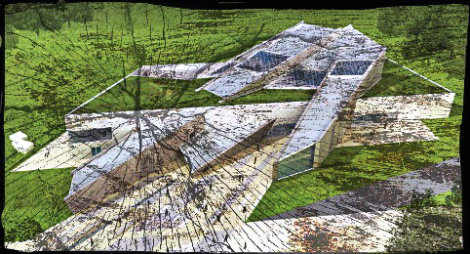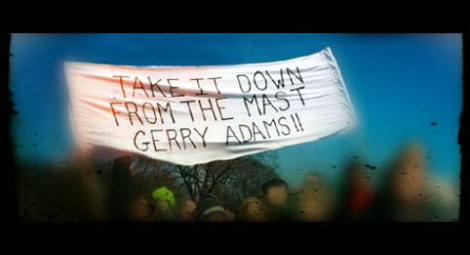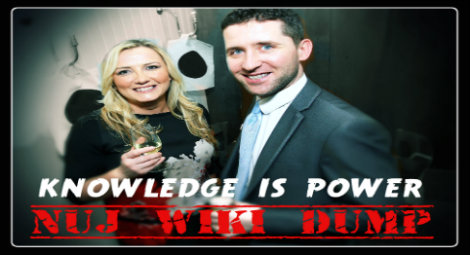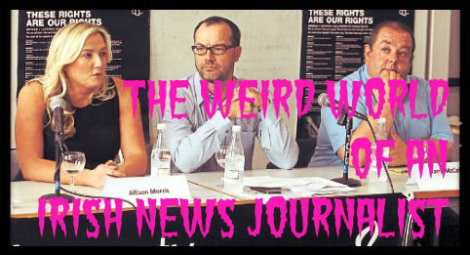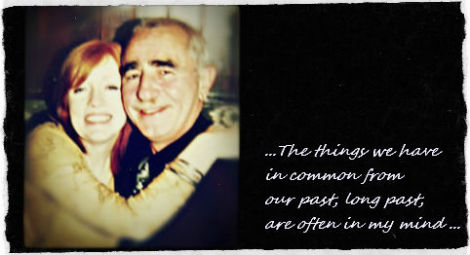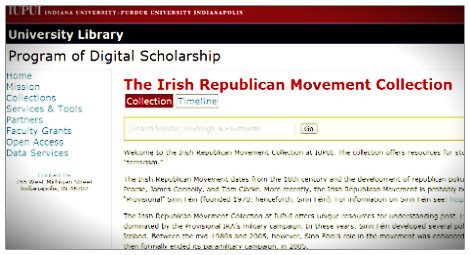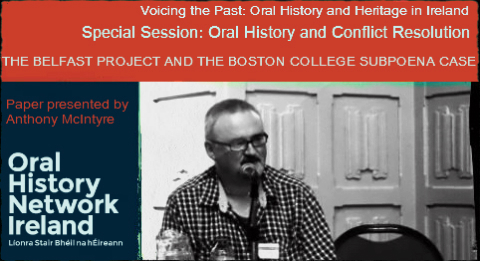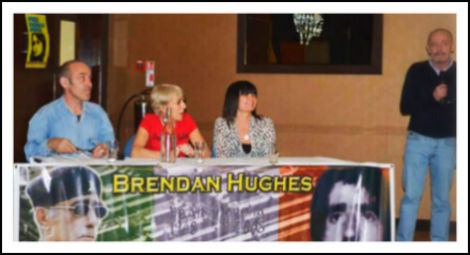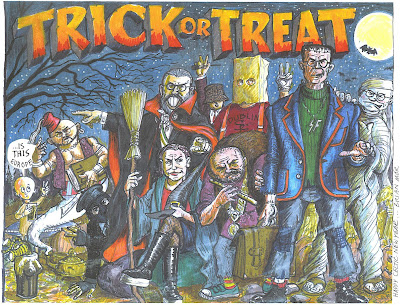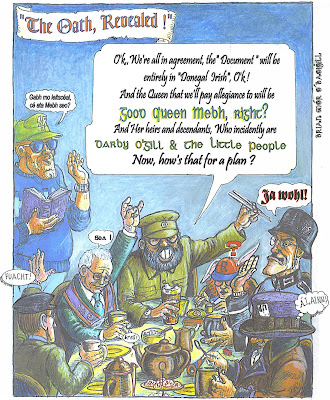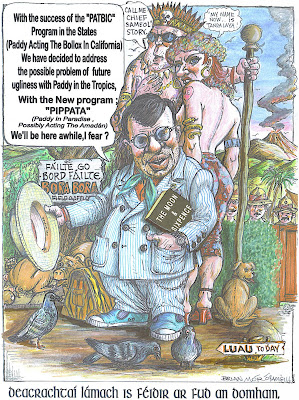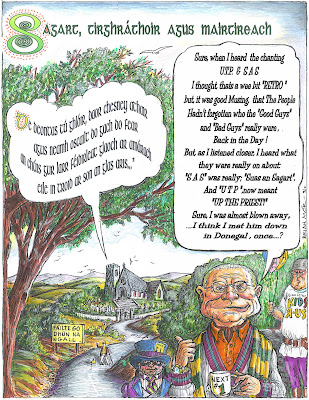Wiki-Dump
All correspondence in relation to Allison Morris' and Ciaran Barnes' complaints and the NUJ's handling of the issue.
Dolours Price Archive
"I look forward to the freedom to lay bare my experiences unfettered by codes now redundant."
Irish Republican Movement Collection
Annoucing the Irish Republican Movement Collection online archive at IUPUI
The Belfast Project and Boston College
The Belfast Project and the Boston College Subpoena Case: The following paper was given at the Oral History Network of Ireland (OHNI) Second Annual Conference in Ennis, Co Clare on Saturday the 29th September 2012
Challenge and Change
Former hunger striker Gerard Hodgkins delivered the 2013 annual Brendan Hughes Memorial Lecture
Brendan Hughes: A Life in Themes
There is little to be gained in going from an A to Z chronological tour of the life of Brendan Hughes. The knowledge is out there. Instead a number of themes will covey to those who are interested what was the essence of the man.
55 HOURS
Day-by-day account of events of the 1981 Hunger Strike. A series in four parts:
July 5 ● July 6 ● July 7 ● July 8
The Bell and the Blanket
Journals of Irish Republican Dissent: A study of the Bell and Blanket magazines by writers Niall Carson and Paddy Hoey
Sunday, October 31, 2010
Saturday, October 30, 2010
Longer and Stronger
Given that Provo revisionism has been scaling heights formerly attained by their predecessors in the Sticks the Arthurs intervention helps frame matters in some form of republican context. This adds to our understanding of the conflict rather than serving to detract from it as tends to happen when revisionism distorts the prism through which the conflict is viewed.
An example of Provo revisionism came recently via the perspective of the former Provisional IRA activist Martina Anderson. Commenting on the Real IRA car bomb exploding outside a branch of the Ulster Bank in Derry, Anderson, in seeking to place clear Tory blue water between the former IRA she belonged to and the current IRA, dismissed any resemblance or line of continuity between the actions of the recent car bombers and the car bombers of her day. Mark Devenport of the BBC who witnessed her contribution during a Stormont debate summed up her position as follows:
Sinn Fein's Martina Anderson did all the other Stormont politicians might have asked of her - not only condemning the bombing, but calling on people to give information about those responsible to the police. However the jab at "born again Provos" obviously irked her. She rounded on the other speakers, claiming they were providing "a degree of comfort" for the dissidents by associating them with the Provisional IRA's campaign. Ms Anderson then argued that the dissidents and the Provisionals are completely different because the Good Friday Agreement had changed everything and removed the previous justification for resorting to violence, namely that Northern Ireland had been an unreconstructed "Protestant parliament for a Protestant people".
In arguing as she does Anderson is in effect repackaging the Provisional IRA’s armed struggle, seeking to mask its catastrophic failure, by linking it to a goal the organisation had never set itself - equality within the partitioned British state of Northern Ireland - and was long contemptuous of for its serious limitations in terms of republican ideology. For the Provisionals, during their war waging endeavours, the shortfall was simply too great. Argue as she might that the Good Friday Agreement ‘changed everything’ it in fact changed only the internal political landscape within the North. It changed absolutely nothing in terms of meeting the core demand of the Provisional armed struggle. The question of sovereignty went untroubled by the Agreement.
Any student of the political history of the North conflict can sense immediately that the Anderson case is piffle. The dynamic feeding the conflict arguably had its roots in inequality coupled with state repression. The grievances emerging from that dynamic were weaved into an ideological republican framework by the Provos, the apex of which was most demonstrably not equality within the North but the abolition of the north as a political entity.
Arthurs nailed the piffle immediately with his comment to the Tribune that:
no one can deny that there have been changes in the North but it is an equality agenda being pursued. People did not die, they did not take up arms, for equality. They did so for Irish freedom.
It is this simply stated logic that provides the strong umbilical cord linking the Provisional and Real IRAs. It also explains the difficulty many republicans experienced when they saw their former chief of staff Martin McGuinness denounce armed republicans as traitors. A colleague of Arthurs, Peter McCaughey, also interviewed by the Tribune expressed it:
We were disgusted when Martin McGuinness stood at the gates of Stormont with the chief constable of the PSNI after Massereene and demonised republicans. He did not speak for us.
As he continued to let even more air out of Anderson’s balloon Arthurs articulated a persistent republican sentiment which is far from being exclusive to those republicans who continue to favour armed struggle. Whereas the Derry Catholic advocated that people become informers for the British the Tyrone republican urged that they do nothing of the sort.
It can be argued that an armed campaign is not advisable at this point in time but it will never be right to inform on those who decide otherwise. Informing on republicans will lead to their families being oppressed by the state. It will lead to the arrest and incarceration of volunteers and, at worst, to their death. It was wrong to pass information to the police 20 or 30 years ago and it is wrong now. The graveyards are full of young republicans put there because a small minority of the nationalist community passed information to the British forces.
A poignant, telling comment from a man whose brother lies in one of those graves because someone ‘passed information to the British forces.’
Revisionism as practiced by the Provisionals suffers from the same deficiencies that beset the Sticks when they too tried rewriting history from the perspective of their current needs. Republican memory is longer and stronger than revisionist amnesia. The frailty of forgetting what was fought for finds itself flummoxed each time it arm locks with the muscle of memory.
Thursday, October 28, 2010
Tuesday, October 26, 2010
Breast Cancer Awareness Month
Breast cancer, like all its evil brethren, is an indiscriminate killer, the great leveller waging what seems an unrelenting modern war on young and old - Shelley Fralic, Vancouver Sun.
October is Breast Cancer Awareness Month. Despite the prevalence of the disease I never gave it much thought. I have a recollection of the fight in an English courtroom by a woman in the early stages of the illness seeking to have the NHS fund the drug Herceptin, thinking that it was a disgrace that public finances could not be provided for public health care. A few months ago I browsed through an internet list of well known women who had died from beast cancer, but thought little more of it. Like most other shoppers I could not fail to see the pink ribbons and bags on display in supermarkets but invariably failed to buy any. What spare change I had would usually find its way to some collection bucket or tin on my way out of the store. Even on Saturday in town I gave to the Irish Wheelchair Association after leaving the till area which was well peppered with ‘pink’ breast cancer merchandise.
Then a friend of a friend contacted me via the internet and told me of his passion for keeping the issue in the public eye. His wife had come through the illness and has since spent a year in the clear. He suggested I flag it up in some way. Although pretty much agnostic on the matter, given the manifold causes that could be pushed, I thought I would vent some thoughts on it despite knowing that breast cancer is a high profile illness already. The type of carcinoma is probably one of the more frequently discussed cancers that affect women. As far back as 2001 Barbara Ehrenreich pointed this out:
Thirty years ago, before Betty Ford, Rose Kushner, Betty Rollin, and other pioneer patients spoke out, breast cancer was a dread secret, endured in silence and euphemized in obituaries as a "long illness." Something about the conjuncture of "breast," signifying sexuality and nurturance, and that other word, suggesting the claws of a devouring crustacean, spooked almost everyone. Today however, it's the biggest disease on the cultural map, bigger than AIDS, cystic fibrosis, or spinal injury, bigger even than those more prolific killers of women -- heart disease, lung cancer, and stroke.Despite this prominence in public health discourse and my suspicions of the pink phenomenon resembling a cult where dissent from the prescribed modes of behaviour in responding to it is ‘a kind of treason’, as alleged by Ehrenreich, it struck me that a month dedicated to increasing awareness about it can only be a good thing. For as Shelley Fralic, now lump-free, after a 1987 scare, argued in the Vancouver Sun, every day of the year is about breast cancer awareness for women. She adds that:
the most recent data from the Canadian Cancer Society indicate that one in nine women will get breast cancer; one in 28 will not survive it … we read obituaries and pause on the photos of beautiful young women and know, without even reading the details, that breast cancer is the culprit.In Ireland 2,500 women are diagnosed with the illness each year. Viewed in those terms it is a stalker worse than any serial killer we may read about in the tabloids.
Cancer is something I am familiar with due to both parents having died from it, a sister surviving it, another sister’s husband being claimed by it, and numerous aunts, uncles and cousins having it marked down on their death certificates. I remain unsure what side of the line I fall on in terms of causal factors, genetic or environmental. A case study of cancer during a technology course in prison helped nudge me in the direction of seeing it as environmental; that long term effective treatment would be applied socially rather than to individual biological structures; that a cure as such would not be found but if we could change the way we lived the preventative effects would be so great that the elusive code to cracking the curse might no longer seem so pressing.
Yet I am not a campaigner nor am I about to become an ‘unrelenting crusader’ on this issue. I simply had my curiosity aroused to the point of following my nose. Consequently I read Barbara Ehrenreich’s engaging, critical, challenging and provocatively stimulating 2001 essay in Harper's Magazine, 'Welcome to Cancerland', which detailed her experience of the disease including the discovery stage which she described as ‘the fog of anaesthesia that hangs over those first few weeks.’ Hers, as well as being combative, was a nuanced perspective which goes ignored or marginalised in the surface discourse.
Nevertheless, if addressing the issue so much as helps in some way to prompt one woman to take a mammogram whom otherwise might not have, or to pay greater attention during self-examination, it will be a worthwhile accomplishment. I know I will insist on my daughter at home who is not yet ten, taking all necessary measures as she grows up to ensure that she increases her chances of evading this particular attacker. Awareness leads to alertness which in turn enhances preventative potential, allowing people to confront, fragment, dissipate and ultimately head off the disease at the first defensive echelon where it has less chance of establishing a beachhead from which to launch its deadly invasive salvoes.
Women’s breasts are more important to their long term health and wellbeing than their teeth. The same attention should be paid to mammary self examination as to oral hygiene. Little point in beating a lost breast in anguished regret after a mastectomy.
Monday, October 25, 2010
Campaign Has Taken Off
Tonight the Pensive Quill features a statement from the recently formed Justice for The McGeough Family
The general consensus that society here must now "move on" from the era of the troubles is being seriously undermined by an on-going legal saga that is causing growing resentment among nationalists in Tyrone and which is now starting to gain attention elsewhere across Ireland and beyond.
November 1st sees the resumption of a trial that is raising issues of major
concern to international Human Rights groups as well as bringing to light
matters that the British government, in particular, would prefer left untouched.
At the centre of the controversy is 52-year-old Gerry McGeough, a teacher and
published author from the Brantry area of South Tyrone, who is now the focus of political and legal storm that has dragged in the Swedish government, the U.S. and German authorities and a host of interested parties from several other
nations. Added to this is a growing litany of revelations that has opened a
Pandora's Box of secret deals and leaked intelligence memos that are beginning
to cause major angst within some political circles.
The saga began on March 8th, 2007, the day after the Stormont Assembly elections when Gerry McGeough, who had stood as an Independent Republican candidate in the Fermanagh/South Tyrone constituency, was dramatically arrested outside the Count centre in Omagh. The large media contingent gathered for the Tally just yards away ensured that the arrest became news headlines within the hour.
A convoy of PSNI vehicles took McGeough to Antrim, where he was eventually charged with membership of the IRA in 1975, when he was 16-years-old, and with wounding a part-time member of the UDR in 1981.
Shortly after McGeough's arrest, Vincent McAnespie, an Aughnacloy Building
contractor in his late forties, was also arrested following a raid on his home.
The charges against Mr. McAnespie were eventually reduced to possession of
weapons in 1981.
Explaining the unusual manner of Mr. McGeough's arrest, the PSNI claimed that they had been looking for him for years but had not been able to locate him
until his appearance at the Omagh Count Centre. Gerry McGeough has dismissed this as "ridiculous", pointing out that apart from the fact that he had been living openly in the North before the election, he was also one of the most high-profile candidates during the hustings, speaking regularly in public and making appearances on T.V. and live radio programmes. "My arrest was politically motivated", he says, "and sanctioned by the British government. If a political candidate was arrested during an election in Zimbabwe, or anywhere else, the British would be squealing about human rights abuses".
After three weeks in Maghaberry prison, McGeough's lawyers finally secured bail for him following a considerable legal struggle during which the Prosecution tried to prevent his release by claiming that he was wanted in Germany and the United States for Irish republican related activities in the 1980s. When these accusations were found to be groundless, he was released on strict bail conditions, most of which remain in place over three-and-a-half-years later.
McGeough, who lives with his Spanish-born wife and their four young children,
spent the next couple of years making monthly court appearances during which the case was constantly put back, sometimes for the flimsiest of reasons, such as
someone at the DPP had forgotten to post a letter crucial to the investigation.
During this time, the family had to put up with many hardships including having
British Army helicopter hover and clatter over their remote rural home at
eleven o'clock one night as small children struggled to sleep. They have also
had to endure phone-tapping, e-mail and regular mail interception and
disruption. In addition, because of the serious Troubles-related charges against
him, Gerry McGeough has been unable to find work as a teacher since his arrest.
In July, 2009, McGeough suffered a massive heart-attack and would have died but for the fact that he managed to get himself to hospital in time for emergency
treatment.
That same month, the British government extended the use of the non-jury Diplock Court system for another two years. A notorious legacy of the Troubles, the Diplock Courts were supposed to have been finally phased out by 2009.
On March 8th, exactly three years after his arrest, Gerry McGeough was put on
trial before a Diplock Court in Belfast. The previous day, the Sunday Tribune
newspaper revealed that a secret deal had been done between the British
Government and Sinn Féin allowing up to fifty "on-the-run" republicans to
receive Royal Pardons since the signing of the 1998 Good Friday Agreement.
Shaun Woodward, Britain's then Secretary of State for the North, publicly
denounced the revelation as "nonsense". Shortly afterwards, McGeough's lawyers produced one of the Pardons and the Northern Ireland Office has since confirmed hat a deal had, in fact, been done.
Arguing that their client, who is one of the listed "on-the-runs", was being
discriminated against for political reasons, McGeough's legal team secured an
adjournment of the trial after three days while they sought the disclosure of
documents from the NIO for an "Abuse of Process" application.
Despite ample evidence of the existence of such material, a judge ruled that the
NIO need not disclose some forty-one relevant files in the interests of
national security". He also dismissed the "Abuse of Process" application and
the trial resumed on September 13th. That day consisted of having a PSNI
detective read a full chapter of one of Gerry's books to the court. He had
secured" the book from a library in Dublin. The novel itself, "Defenders", is a
work of fiction published in 1998. Incredibly, this has been accepted as
evidence" by the non-jury court.
The trial against Gerry McGeough, which is estimated to have cost £1 million to
date, was halted again the following day after McGeough was rushed to hospital
where he underwent a further heart procedure on September 17th. He has since
been released from hospital and the trial is set to resume on November 1st.
If convicted, he will spend two years in prison under the terms of the Good
Friday Agreement before being eligible for release on license. McGeough argues that his children, all of whom were born since the year 2000, are the real
victims of the Troubles. He describes how one morning last March, as he prepared to leave for court in Belfast, his seven-year-old son got up out of bed at .30am in order to share an idea he had.
He told me that he was going to dig a hole in one of the fields, put planks
over it and build a den so that he could hide Daddy. That way I wouldn't have to
to to jail", Gerry recalled. "Imagine a child lying awake at night worrying
about such things in the year 2010. This whole experience is a real trauma for
them. Why should they have to be put through this?
A staunch supporter of the Peace Process, McGeough believes that he is being
singled out simply because he stood in the elections and expressed a viewpoint
hat upset the powers that be. "Why are no British soldiers being put on trial for Bloody Sunday"?, he asks. ‘And what about those behind the Dublin/Monaghan bombings? Either the Troublesa re over or they're not. If not, then let's put everybody on trial before Diplock Courts.What's happening to us is just plain old anti-Irish Catholic discrimination. People can see this and they resent it". Gerry McGeough said.
Meanwhile, it has now emerged that the Prosecution intends to use alleged
political asylum application papers from Sweden as the mainstay of its evidence
against Mr. McGeough. The move has raised considerable alarm among international Human Rights groups, who argue that this violates the whole concept of political asylum and is an attack upon the rights of refugees everywhere.
We, the recently formed "Justice for the McGeough Family" pressure group, are
asking people from all walks of life to become involved in the campaign to
highlight the discrimination currently being perpetrated against Gerry McGeough.
Write in protest to your local media and politicians. Keep Gerry and his family
in your prayers and, if possible, turn up at the trial in Belfast, now scheduled
for November 1st, and show your solidarity.
This is a just cause that needs your support. Now is the time to speak out
against this injustice and we thank-you for your help.
Sunday, October 24, 2010
Celestial Battle On Merseyside
What Blackburn, a club formerly managed by Liverpool current boss Roy Hodgson, did to incur the wrath of the Lord is uncertain. No doubt a press release from the Vatican will explain all in good time, just as similar releases have persuasively explained other things.
In scoring today, Torres has increased by 100 per cent Liverpool’s win tally in the English Premier League this season. They now have two wins rather than one even though goal difference keeps them in the bottom three. Crowds are said to be gathering on the banks of the Mersey to watch the team walk on water across to the Wirral. The atmosphere is infectious. Makes me feel like running into the street and leaping for the Lord or jumping for Jesus.
The good Lord must be a Liverpool supporter otherwise he would have divinely intervened the other way and given the game to Blackburn. That’s the logic of miracles. Had he wanted to because he is all-powerful he could have allowed both Liverpool and Blackburn to win today. He chose not to for reasons our limited and finite minds cannot possibly comprehend. Anyway, had he done so, he would have been accused of plagiarising the patent of the peace process. Making people believe everybody wins is one of its tricks.
Having written all this with a dog collar in one hand and a bible in the other (typed with my teeth) the dark thought just crossed my mind that today’s result may not have been the work of the good Lord after all but rather that of the devil. Maybe the good Lord was actually in Holland intervening on behalf of PSV Eindhoven against former European greats (a bit like Liverpool in that regard) Feyenoord. His reason for going Dutch? Simple. He was continuing with his missionary work on the question of one of the seven deadly sins in today’s soccer world – greed. Why Feyenoord should be targeted we don’t really know. They are a Rotterdam based team. Why not Ajax of Amsterdam with its proximity to the city’s red light district? The intervention of Mary Magdalene perhaps, having listened to the importuning prayers of Belle de Jour. Ours is not to reason why. Suffice to know that nothing other than divine intervention could possibly have produced a 10-0 defeat at the hands of PSV. That was the type of result Bangor and Clintonville used to get against Linfield and Glentoran back in the 1960s when the presence of the good Lord was very palpable in the wee Province. Swings were chained up and parks closed in honour of the good Lord. Suffer little children and all that. Yes, truly, truly I say to you, the Lord must have been in the Netherlands this afternoon.
While he was busy in Holland his old adversary the devil slipped into England via the back entrance, usually reserved for clergy, to put a spoiler on things. His aim, simple: wreck the Lord’s missionary work against greed in soccer and give a victory to Liverpool, cause doubt and a corresponding lack of faith in the works of the good Lord. Sew division and confusion and god’s not your uncle any more, Satan is. Sort of complicates things. Besides Lucifer for Liverpool kind of takes the shine away from today’s victory. And Rangers beat Celtic to boot. What use is the peace process if every game can’t be a draw?
Catholics – we haven’t a chance.
Saturday, October 23, 2010
Seeing Red
A 2-0 defeat to Everton cannot be described as a good performance. If they continue to come up with such good displays the team will finish bottom on 6 points. At least I did not find out the result of last Sunday’s derby game until ready to board a plane at a Swedish airport the following morning. My Manchester United friend in Belfast never even roused himself to text me as he usually does; the repetition probably too boring for him. Finding out on Monday might have soured the flight but mercifully came too late to spoil a cold but sweet Stockholm.
Spitting Frank Rijkaard is being hotly tipped to take over from current boss Roy Hodgson despite the latter’s claim to be in it for the long haul. Former captain Alan Hansen thinks it unlikely that Hodgson will go so soon, it not being the Liverpool way. But the current hapless league run is not the Liverpool way either so something has to give. Rijkaard would likely spit nails - rather than the saliva he once aimed at West German opponent Rudi Voller in the 1990 World Cup finals - at the team for performances Ray Hodgson describes as good. Ironically, the then international team mate of the spat upon Voller, Jurgen Klinsmann, was approached by the recently deposed US owners as a possible replacement for Rafael Benitez who they badly wanted to shaft. From the fan's point of view Rijkaard may have been the better choice. He might just have spat in both of their greed contorted faces.
Hodgson puts on a brave face between games but the strain underneath shows when his team are staggering about the field of play. Try as he might in post-match press sessions there is no shining a turd. The team he has is crap. One of his pre-season big name signings has been accused of ‘performing recently as if in possession of two left feet.’ Jamie Carragher may have welcomed the coup d’etat that finally rid Anfield of the two US greed gremlins with his comment that it will permit a ‘feel-good’ factor, but without a feet-good factor to go with it, the Reds will languish in the bottom half of the table for the remainder of the season, proclaiming it a triumph if they avoid relegation. As Alan Hansen said of the team after the humiliating defeat at the feet of Blackpool:
The 11 players who started the game should be embarrassed. They were wearing red shirts at Anfield and produced a totally unacceptable performance in a defeat that left Liverpool in the relegation zone. It was an embarrassment. Forget about the history and tradition of the club. Pride also comes into it, but, if the pride isn't there among the players, then there is not a lot of hope for the club.
The lion’s share of culpability does not go to the coach. He took his place at the table with the hand he was dealt, but his tendency to venture out from his burrow, sniff the air and predict good times to come merely sketches an image of Arthur Daley. There have been enough clowns at Liverpool in recent times without the main man trying his hand at a skit.
Liverpool FC will go nowhere until the red shirt replaces the red nose.
Thursday, October 21, 2010
Tuesday, October 19, 2010
Redbelt
Fight films are not what I watch as a matter of choice, Fight Club being the sole exception in recent years. But this, written and directed by David Mamet, proved to be a powerful social drama in which the central character tries to walk a straight path, pays his way, respects the dignity of others, seeks to screw nobody and ends up being crapped on by just about everyone he comes into contact with.
A martial arts theme runs throughout but of a different order from what we were used to as teenagers through Bruce Lee films. This was Jiu-Jitsu rather than Kung Fu and apart from the final minutes the invincible superiority of the heroic character that fight films tend to produce was kept off stage. In the average Kung Fu movie the violence is what keeps it interesting. In Redbelt the real tension was reserved for the plot. It could have been something else other than fighting that provided the backcloth. With a few tweaks to the plot racing would have done the job just as well.
Brazilian Jiu-Jitsu is a martial arts sport which is fuelled by the concept that a weaker opponent can overcome their more powerful adversary through the application of leverage positioning. This fighting technique becomes the central theme of the movie as the central character is drawn into a battle not of his making and decides to make a stand despite the precariousness of his position in the face of great odds.
Mike Terry, played superbly by Chiwetel Ejio, runs a Jiu Jitsu club where he teaches the fight game skill to cops and others. Cash is short and his cheques to suppliers begin to bounce. He tries to hold the line and has no interest in fighting competitively. Piece by piece the previous stability in his world loses its cement and begins to totter, always threatening to topple over.
The series of unfortunate coincidences experienced by Mike Terry soon begin to appear not so coincidental at all as a thread of manipulation and deceit weaves its way throughout the plot. Equipped with nothing approaching the Midas touch, Terry has soon run out of options and the debts continue to mount. He faces a situation where his wife tells him she has borrowed serious money from a loan shark who in turn claims to have borrowed it from sources that make him uncomfortable. He has no room to manoeuvre and needs the loan back. With a shortage of solutions, suicide for someone seems a certainty, if not for Terry then someone close to him.
Terry is the victim of a carefully put together conspiracy to draw him into competitive fighting although it is impossible for him to see it until too late. Corruption, scams, blackmailers, dodgy lawyers, fraudsters permeate. In the end a rape victim he taught self defence to is the sole stanchion upon which he can rest his troubled mind. But her mind is equally as troubled and for a while the film conveys the feel of drowning people reaching out to each other.
The strong element of predictability in this film, in terms of where its ultimate destination lies, is more than compensated for by the suspense and twists that punctuate throughout.
Sunday, October 17, 2010
A Season on the Brink
A book detailing that memorable night and the season that was in it, I discovered by chance browsing through the used book section of a shop run by the Simon Community in Dundalk. For the grand sum of a solitary euro I became the contented owner of a possession not really coveted up until that point due to my being unaware of its existence. That I called into the shop made for a nice coincidence. I was on my way back from having just purchased two Liverpool match tickets as a birthday present for my sister and decided to have a nosy. Although the book was much less expensive than the tickets, there was no temptation to switch presents!
Guillem Balague, the author, is a Spanish football journalist and was no stranger to the coaching technique of Rafael Benitez who achieved major soccer success with his previous club Valencia. Of course, when I was charging through Balague’s A Season On The Brink sitting on a canal bench, the book’s main focus, Rafael Benitez, was still the man in charge at Anfield. Liverpool were having a decent season and there was no indication of the howler to follow and the eventual departure of the Spaniard from the Kop scene. A Season on The Brink purported to offer an assessment of the Benitez impact of on the team in the wake of the departure of the club’s previous coach, Gerard Houllier.
Balague proved too eager to dismiss Monsieur Houllier and lionise Senor Benitez. Houllier departed from the club on better terms than Benitez, leaving behind him more silverware in the Liverpool boardroom than his Spanish successor. In the end neither of the two were able to deliver the successes of the Shankley/Paisley era, leaving a Liverpudlian generation with no memory of league title success.
There cannot be too many managers who have a book written about their exploits in one season alone. A more revealing account should deal with the full Benitez term there. One from the man himself would not go amiss. Rafa was done for by a string of bad results and little silverware. His considered take on the descent of Liverpool would add ballast to what at the moment is speculation. Regardless, if there is no quarrelling with success, failure then can’t make much of a case.
Balague argues that on the Istanbul night Rafa ‘did what all great leaders are able to do: he showed others how to get themselves out of trouble.’ This verdict has to be called into question by the experience of Rafa’s later years at the club which brought little success. The power of Stephen Gerrard on the Istanbul pitch was arguably more crucial than anything Benitez did off it. Gerrard nevertheless emerges as a character in need of constant reassurance. Benitez, we read, would, unlike Houllier, never go to the Gerrard door cap in hand, knees on the mat, to tell him how essential he was to the club’s future. That Gerrard did not switch ships as they passed in the night and meet Chelsea on the way to their zenith, instead accompanying Liverpool to their nadir, must play on his mind when he looks at his relatively sparse personal trophy cabinet. Balague seems to have overlooked the current Liverpool captain in his comment, ‘the lads quickly realised that you get nothing for yesterday.’
For Liverpool fans the book is an uncomplicated foray through the first year of Rafa’s reign and would hold their interest. Fans of other clubs will be attracted to it only for the tittle tattle they presume to be there. Balague also throws light on the behind the scenes arguments that afflict every club. They might draw the supporters of other teams quicker than the lauding of Liverpool’s footballing prowess.
There is a wide mosaic of voices in this book including some from the AC Milan Camp, the vanquished of Istanbul. Gattuso conveys the sense of despair setting into the Milan team as it realised, despite having gone three in front, that everything was coming apart in front of their eyes. There is a touch of the action replay to it as each goal in the final is analysed from different perspectives but this takes nothing away from it.
Overall, Ballague’s book may not be as good as others about Liverpool FC, but for the fans it is one to display on the shelf.
A Season on The Brink by Guillem Balague. Weidenfeld & Nicolson: London 2005
Friday, October 15, 2010
Wednesday, October 13, 2010
Joe O’Connor – Ten Years On
The O’Connor family, like every other family affected by the conflict deserves answers concerning the killing of Joe – Mark Thompson, Relatives For Justice.
Ten years ago today the Provisional IRA in full public view shot dead the Real IRA volunteer Joe O’Connor as he sat unarmed in a car in West Belfast’s Ballymurphy Estate. Despite numerous eye witnesses the Sinn Fein sponsored militia denied the killing and moved to intimidate anyone prepared to say anything to the contrary. Few people believed the Provisional denial although a small number of journalists abandoned what - if there was ever any to begin with - integrity they may have had, traded in their reputations and ran with the line anyway. Ten out of every nine people declined to believe the grovelling hacks.
The killing of Joe O’Connor was clinical and ruthless. He stood no chance, trapped in a car as the state shoot to kill squad closed in on him. Whether there was collusion leading to the death is a moot point. There most certainly was after it, the inference easy to draw from the comments by the coroner at Joe O’Connor’s inquest.
As well as being a brutal killing it was ultimately a futile one. Ten years on and the Real IRA is on its feet and very much in business whereas the organisation that gunned Joe O’Connor down is on its knees sucking the PSNI truncheon. The killers thought he would be long forgotten by the time his tenth anniversary came about. They were frustrated in that as well. Today his mother backed by Relatives For Justice called for the truth behind his death to be brought forth. Last weekend a commemoration took place at his burial site attended by his family, friends, comrades and republicans of different hues.
It has been said of the logic of capital punishment that it is in essence contradictory because it is premised on the absurd concept that killing people is a proper way to demonstrate that killing people is wrong. The same reasoning can be brought to bear on the Ballymurphy killing ten years ago. How the killers ever imagined that one way to influence the Real IRA to take the gun out of Irish politics was to use the gun against one of their volunteers defies reason. The Real IRA could only have had their militaristic orientation reinforced as a result of the killing; that guns were indeed an appropriate way to deal with opponents. The legacy is on the streets of the North today.
In today’s Irish News the mother of the murdered man, Margaret O’Connor, spoke about his death. She asked for closure:
there is all this talk about truth commissions and people owning up to what they did but no one has ever admitted killing my son … his children deserve to know who killed their daddy and why … I just want the PIRA to admit they killed my son. I need them to admit that they did it so that my family can have some kind of closure.
Margaret O’Connor is unlikely to get the acknowledgement she needs. The organisation which killed her son has long called a spade a shovel and is unlikely to concern itself with justice. Nevertheless, some people who were members of the Provisionals at the time of the killing have since spoken out against their organisation’s action ten years ago today. One who spoke at Saturday’s commemoration for the dead man apologised.
On behalf of grassroots Provisional IRA Volunteers and Sinn Fein Activists, I apologise to the O’Connor & Notarantonio families for Joe’s political assassination. I make the apology as a former Provisional IRA Volunteer, former Sinn Fein member and Ex- Political Prisoner.
There is not now the slightest doubt about the culpability of the Provisional IRA. Those who in the immediate days after the killing may have been manipulated into a confused state by Provisional lying can no longer be shielded from the truth of what happened on Friday the 13th October 2000.
In plain simple language that the peace process has difficulty understanding, Joe O’Connor was butchered by the Provisional IRA. .
Monday, October 11, 2010
Bombing Derry
…it's pointless demonising the dissidents as gangsters with no politics. There are clear parallels between their campaign and the Provos. The Provos were wrong then and the dissidents are wrong now. Their campaign will bring death and misery to all involved.It is probably only a few who feel that the whole purpose of the Derry attack was to rub Martin McGuinness’s nose in it. But doing so was almost certainly one factor in the Real IRA’s strategic deliberations. While McGuinness was lining up with the British Tories at their annual conference, where they marginalised him to the fringe, the Real IRA was announcing with a bang that the former Provisional IRA chief of staff was a busted flush in terms of his ability to hand the head of republican political violence to the British state on a plate. The timing of the attack led McGuinness into standing shoulder to shoulder with the squires from the shires in a crescendo of condemnation of republican armed activity. In his critique of the bombers the North’s Deputy First Minister referred to them as conflict junkies and Neanderthals. The irony was not lost on observers who have been quick to point out that the Real IRA are branded Neanderthals because they seek to ape McGuinness who in his day blitzed Derry.
After the killing of two British soldiers in Antrim in March of last year Martin McGuinness lambasted the Real IRA as traitors, demonstrating the validity of Tallyrand’s comment that treason is a matter of dates. If the organisation was irritated by the comments it maintained an inscrutable expression. But when the opportunity presented itself to turn the worm the Real IRA did so with rapier like delivery. It issued a statement designed to position McGuinness as far removed from republicanism as Margaret Thatcher. A Real IRA spokesperson told the Sunday Tribune:
It was entirely appropriate that Martin McGuinness's condemnation of the IRA operation came from the Tory conference. The man who once bombed Derry into the ground is now on the side of bankers and big business. His sentiments are in keeping with those of his Tory friends. The contrast between McGuinness and those still committed to the republican struggle couldn't have been greater.It was a stinging rebuke for the former Provisional IRA leader whose political and strategic achievements were shown to be tiny when the British Prime Minister, David Cameron, made it clear that the North of Ireland might as well be Finchley. Perhaps for this reason the Irish Times could comment, ‘… it can hardly be denied that the dissidents are now solidly rooted in the place republicanism was anchored through much of the conflict.’
Sunday, October 10, 2010
Saturday, October 9, 2010
Desperately Seeking Sarah
Unlike much from recent horror industry output The Dark did not rely on the power of special effects but opted for the earlier methods of inducing fright. There were lots of things going bump in the night and appearances of spectral forms to cause the heart to miss a beat. There were times during it when I felt a shiver not only go down my spine but shudder right through me.
Adèle, who has been living in New York, decides to travel to Wales, where her daughter’s father James is a sheep farmer. Apart from the animals his sole companion is an unfathomable shepherd who tends to the flock while the reclusive James takes time out to paint. By making the trip to Wales Adèle hopes to bring some stability to Sarah’s life and remove the turbulence that has adversely affected the mother-daughter relationship.
First signs were ominous and when sheep almost knock Adèle into the sea as they leap like lemmings to the waves below, it does not dawn on her that sheep should not behave like the cliff top departing rodents. If there was a moment to consider a return flight to New York it was then. From that point on fortunes and some other things begin to plummet.
The endeavour to achieve family harmony was destroyed within days when Sarah was lost to the sea. 60 years earlier there had been a mass suicide performed on the hill from which Sarah fell to her death. A deranged but manipulative preacher had persuaded his equally deranged but more gullible congregation that beyond the waves lay the afterlife. At one time the preacher owned the farmhouse where James now lived.
From this point on the film is peppered with the anguished wails of ‘Sarah, Sarah’ from a desperate mother. Sarah’s father leads the hunt for his daughter’s body. Strained by anguish that he had not been at her side when she was lost he wanted to be there for her when she would be found. Tension builds up between him and Adèle because she sketches apparitions while he searches the sea. Their previously traced separate paths continue to diverge.
The mother, clearly unable to come to terms with the loss, retreats into a spooky world where conjuring up people long since dead focuses her mind. She learns from the annals of Welsh mysticism of the supposed existence of a place called the Dark. There she convinces herself is the location of her lost daughter.
When she discovers the sickly teenage Ebril in her daughter’s bed, Adèle becomes convinced that Ebrill knows where her daughter is and how to get her back. Undaunted by being told that Ebrill drowned many years ago, had returned but brought something back with her that was best left at sea, Adèle persists in her quest. But the legend of the Dark is that it only allows a person to be returned in exchange for another. It is clear where the story line is heading.
The film can be hard to follow particularly towards the end. I was never quite sure who made up the living and who were dead. The scenes became so interchangeable that it became impossible to say if they were in the Dark or in the farmhouse.
A viewable if confusing movie there are enough chills and frights throughout to keep the horror aficionado on board to the end of the journey across a dark stretch of unyielding currents determined that what they have they hold.
Thursday, October 7, 2010
Tuesday, October 5, 2010
Egg Face Enda
The pairing system is bog standard nudge and wink politics in the Dail. It permits elected representatives to be absent from votes without detracting from their party’s voting strength because someone from another party will agree to be absent at the same time. It keeps things on an even keel.
Enda Kenny thought he was onto a great thing when he opted to shaft the Fianna Fail government. Constrained by diminishing numbers in Leinster House’s tight voting game, the Fine Gael leader sensed an unprotected jugular and blood. And with all the ferocity that any toy teddy could muster he set out to get it. Tanaiste and Minister for Education Mary Coughlan was due to attend a meeting in Chicago. Its purpose, according to the Irish Times was:
aimed at boosting the level of attendance by US students at third-level institutions here, which currently has an estimated value of €900 million to the economy.
Mary, rather than feeling a fair wind at her back, found the outstretched foot of Enda catching her from behind before she even set foot on the transatlantic fight. The Fine Gael leader must have felt like giggling all the way to the political numero uno spot. That was until Labour came along, paired off with Coughlan, and hit him square in the face with an egg so big the whole country could see it. It was so well spread there seems to have been no part of the facial anatomy left splatter free. Protest as he might that he was not blushing, that his face was white and yellow, most observers knew it was bright red, Labour red.
How did Kenny make such an error of judgement? Given that his decision to shaft Fianna Fail on pairing was so vulnerable to a little political upending from another party, it is baffling that Kenny failed to first cover his left flank before setting out on his daft venture, and strike a deal with Labour on the matter before abandoning the deal he had in place with the government party. While he was upfield taking a questionable shot at Fianna Fail’s net, Labour were converting with aplomb the penalty kick he gave them. Wally of the year.
That he managed to steal some of the Brian Cowen’s threadbare credibility is probably why his rating in the opinion polls is well behind Labour leader Eamon Gilmore. Potential voters are likely to think that if Enda does not look over his shoulder on matters this simple he cannot be trusted to steer the economy out of trouble and is more likely to have some juggernaut of a bank ram into the back of him as a prelude to start the screwing procedure all over again.
Fine Gael is now reduced to slamming Labour’s claims of having no intention to go into government with Fianna Fail after the next election. Gilmore has already insisted that it is ‘crystal clear’ that Labour are ‘not going to put Fianna Fail back into government in any form after the next election.’ Even if Gilmore is spoofing nobody believes that Fine Gael will not suck up to Labour if by doing so it is assured of being in government. And Gilmore played it very well with public opinion by pushing patriotism before party:
We should not obstruct a Minister going to an event which might have the potential down the line to generate jobs or to generate investment in the country ... we have 450,000 people out of work in this country and we felt that the priority really is to do whatever can be done to try and get jobs for people and to try and get investment in this country ... Our main criticism of the Government is that they haven’t done enough of this.
With Labour as the left most party in the Dail, Enda Kenny is positioning it nicely as a serious contender for breaking the mould and providing the next Taoiseach.
Monday, October 4, 2010
Sunday, October 3, 2010
Woeful Wanderers
While supporters may be divided on their thoughts on Benitez himself, what they are united in is their hatred for owners Tom Hicks and George Gillett - This Is Anfield Website, June 2010
A friend sent me a text this afternoon from Belfast. He is a Manchester United fan. Contrary to popular opinion they do have friends, and I continue to value my friendship with him. At the same time I carry on in the hope that his condition is curable.
The purpose of his brief message was to gleefully tell me that Liverpool were 0-2 down to Blackpool at half time in today’s game at Anfield. The wrong pool later won. Blackpool, for long enough identified as somewhere people would go to get on a fun ride rather than watch a soccer game, are now having a fun ride at Liverpool’s expense. I was not indifferent to the news but not greatly disappointed. Resignation best summed up my mood. There were no surprises there. That I never bothered following the game as it happened just about sums up my level of enthusiasm.
The Spirit of Shankley group organised protests before and after the match. Last week 9000 fans stayed behind after the game to express their dissatisfaction. They want rid of the current American owners of the club and one of the banners on display was emblazoned with the words ‘Yank Liars.’ That probably makes the Shankley group the most radical political force in British politics today. There is not much in the way of rivals.
Six points from seven games, languishing in the relegation zone, the future must look orange given that the orange of Blackpool overran the red of Liverpool on the pitch today. For someone of my ilk to long for a return to the Paisley era might sound strange to many. Nothing to marvel at, however, it is boot room Bob man rather than boot boy Ian. Under Bob Paisley’s leadership Liverpool enjoyed the most successful spell in its 128 year history. It has not been emulated since. It might never again.
As is inevitable the club coach will take a lot of flak. Liverpool fan and journalist Aaron Cutler argued:
Roy Hodgson’s Liverpool tenure has failed to ignite. A stuttering start to the season has dispelled any hope of a honeymoon period and instead exposed many of the same old frailties. Nobody expected a quick fix but signs of progress were anticipated, however small.
And that was before today’s debacle. Yet it is pointless to blame the current coach. As a friend ventured to me last week he was brought in to manage the decline, not achieve anything. Hodgson might have a reputation for managing well on limited resources but there is nothing to be carved from rotten wood. Trying to revive the club under its current owners is like giving the kiss of life to a corpse.
All those who blamed Rafa Benitez for the plummeting fortunes of the team, must now be looking back on his tenure as a golden era. The best thing about his departure is that it has shown clearly that he was not the problem there. True, his transfer forays were dubious at times, but he never managed to become one of the three Amigos propping up the rest of the Premier League.
Liverpool play old Merseyside rivals Everton next week. As a normal derby game it is important in its own right. But with both teams scraping around the bottom of the Premier barrel, on shared points from a similar number of games, there will be a sharper edge to matters. It might be seen more in the stands than on the pitch. While there is little to say that either team will rise to the occasion, the safe money has to be on Everton. What William Hazlitt said of man is true of Liverpool supporters:
As Man is the only animal that laughs and weeps, for he is the only animal that is struck with the difference between what things are and what they ought to be.
Fascist Bill
Tonight The Pensive Quill carries a letter from RNU Ard Comhairle member Tony Taylor.
A Chara,
On behalf of the Republican Network for Unity (RNU), I’d like to claim
victory as the draft Public Assemblies Parades and Protest Bill surpassed
its dead line and fell flat on its face.
The Bill spouted by Provisional Sinn Fein as having far reaching
benefits for the republican & nationalist community. Protecting them from
orange feet served only to facilitate Loyal Orders in their discussions
during and after the draft of the Bill.
The outcome was a fascist Bill scribed and promoted by Sinn Fein & the
DUP. That was designed to curtail resident’s rights, criminalise
Republicans and ostracise anyone else opposed to orange feet trampling
through vulnerable communities.
Furthermore, the Bill was to criminalise Nationalists and Republicans who
exercise their legitimate right to oppose abuses against the public by the
RUC/PSNI who regularly carry out unjustified abuses against women and
children. (Highlighted during discussions with Derry Priest, Fr. Paddy O
Kane).
Only the following were consulted when putting the Bill together; the
RUC/PSNI, Spike Murray (senior Sinn Fein Activist), Mervyn Gibson,
(Deputy Grand Chaplin of the Grand Orange Lodge of Ireland & a
former Special Branch Officer) and finally a number of community and resident groups. Although, they failed to properly represent the voices of communities that have been forced to endure unwelcome parades.
Considering the working group had been advised by the Human rights
Commission when drafting the Bill. It is shocking that Stormont
Politicians did not feel the need to take identified violations of our
human rights into consideration. Which again demonstrate, just how arrogant
these Political Parties truely are. In their attempts to demonise and
criminalise those who oppose the current institutions.
Due to the back lash by communities across the North and responses like that
presented by R.N.U. opposing the Draft Bill, Public meetings will now be
excluded from the draft Bill. "The primary change will be the removal of
all public meetings from the remit of the legislation. The public
consultation process indicated concern that open-air and other similar
public meetings would be captured by the legislation...........”.
R.N.U. sought just how much this Bill would cost to implement through a
Freedom of Information Request (FOI). We were astonished to find that No
Cost Analysis had even taken place. In light of the greatest economic down
turn in our history, how can Sinn Fein and the DUP explain this? How
much has this Bill cost in its entirety to date?
In addition, No Equality Impact Assessment (EQIA), No Regulatory Impact
Assessment was carried out. No evidence was held as to how the working
group came up with the figure of limiting the numbers to 50 to parade or
protest thus criminalising other demonstrators.
No information was provided, as to how the working group extended their role
to implementing draconian legislation. There was also no information as to
why Sinn Fein and the DUP reintroduced the Emergency Provisions Act. Which
was supposed to be ended under the devolution of Policing and Justice powers
from Westminster. No answer was given, why other elected Parties were
excluded from the process but not the Loyal Orders.
The bias displayed by both Parties towards the working- class, had the
draconian Bill actually been introduced, demonstrates just how far removed
Sinn Fein and the DUP are from the communities they claim to represent.
It is unmistakable that they now wish to please their British masters at any
cost.
In conclusion, R.N.U. believes that the Nationalist and Republican
community have been misled by Provisional Sinn Fein. Throughout the
process, senior Party figures had repeatedly claimed that the RUC/PSNI and
the British Security Services had not been involved in the drafting of the
Bill. However, according to the information obtained by our Network, in
the Freedom of Information Request (FOI). The British Crown Forces
clearly played a central role.
Friday, October 1, 2010
Unreasonable Conclusions
To me there is not a lot to choose between when looking at the peddlers of theology or astrology. The latter has the advantage in that we can at least see the stars they profess to study rather than have to settle for the unlikely story that they are invisible but nevertheless out there concealed behind a burning bush or something. And astrologers tend not to want your head chopped off or threaten you with hell fire if you don’t see their particular star shining as brightly as they do. Nor do they seem inclined toward charging around with their holy book trying to inflict its contents on to the rest of us or burn someone else’s for not being holy enough.
In Enemies of Reason, Dawkins continued with his theme that a growing threat to reason is on the march and should be treated more seriously than it is. He sites much of his fear in the evident decline in interest in science subjects in British classrooms. This when juxtaposed to the rise of what may be called quackery has sent Dawkins’ anxiety antennae bleeping.
I really wonder if Dawkins is not being a bit over the top. People who are obviously hoaxers, many seemingly for the sheer fun of it, with absolutely no intention of proselytising for the cause, hardly pose the same challenge to human understanding as organised religion. An astrologer is like an actor providing public entertainment. The blood is fake but we don’t ask for it to be banned or demand our money back at the cinema on the grounds that Dr Frankenstein could not possibly have created a man. It is hard to imagine the homeopaths stoning women to death because of medicinal promiscuity. The quack pack are a funny lot but you sense they know it already and have a fair measure of tolerance towards other who are baffled by their activity and thinking. Unlike the religious lot they seem not to mind having a bit of fun poked their way.
We live in a world of multi cultural dimensions and other cultures are just something we have to coexist with. And that includes the zany, the pot smoker the gambler, the boozer, the whatever we do. Otherwise, how far should Dawkins and his colleagues be allowed to take matters? Society neither wants nor needs a dictatorship of the scientists. It knows already that scientists between them have manufactured the means of human extinction, the most terrible array of powers any group can possess. To teach not dictate is the licence society should grant science.
Imaginative licence is part of the human condition. Great works like Bram Stoker’s Dracula would not have been produced without it. Science should strive to better explain the imagination instead of suggesting that is just in our imagination, not in reality, that vampires are to be found and we should abandon it because its truth status is negligible. There are things the human mind wants to enjoy without being reminded of the reality underneath. In exploring a beautiful city like Zaragoza few want to hear from their tour guide what the sewers running underground are like despite the fact that without them the city could not function.
Consider the fictions we live with and take pleasure from. Should Stephen King novels not be sold because there is no such thing as blood sucking creatures of the night taking over a town called Salem? The joy I used to derive from King novels during my imprisonment, having been introduced to them by Gary McNally who gave me Carrie, and Martin Livingstone who provided a copy of The Stand – after which I was hooked – would have been denied me, my life made duller than it already was. I didn’t believe Pet Sematery was a place that could have its own version of the resurrection. It was pure fiction but fantasy serves a purpose by inserting a few bends, chicanes and indolent waywardness into the straight highways of science.
Dawkins invariably professes a ‘passionate concern’ for truth and he fears for the science in the world of untruth. I fear for the world of fiction and the novel – even science fiction which I don’t particularly like - in a science defined by expansionism in the worst possible sense of the term.
If there is a danger posed by people being conned out of their money and paying for remedies that endanger their health then that is a matter to be addressed by the law of society. By all means expose Lourdes for the farce it is, the same with the healers-cum-money sucking televangelists in the US. But much of what was highlighted in Enemies of Reason was like gambling: pay your money, pull the arm and hope something bigger comes out than what you put in. Misplaced hope, an illusion, it hardly matters. Is it so necessary for science to purge it?
Dawkins made a play on human progress through modern medicine but had woefully little to say on the very real possibility of quack remedies being considered because the pharmaceutical companies have priced scientifically verified medicine outside the price range of many in dire need of it. Maybe that’s the lot of the ‘undeserving poor’ in a world subject to the laws of social Darwinism.
I believe in the scientific explanation of our world and have no belief whatsoever in religious explanations of my surroundings. Science is to be valued for its explanatory power of the universe above any other interpretation. One reason I respect it is because of its potential to be liberating rather than restrictive. While there is no reason for it to exist on the same intellectual plane as other explanatory frameworks, for it to adopt a religious-like approach to all practices that have a very dubious truth value and seek to suppress them on those grounds is to dangerously politicise science. Given its power coupled with the political ends to which scientific power has been applied, such as gas chambers and atomic bombs, society can only afford to travel down the scientific road to truth not oblivion.













